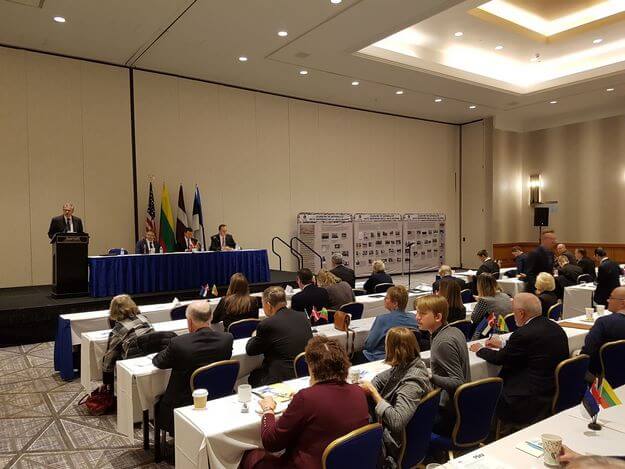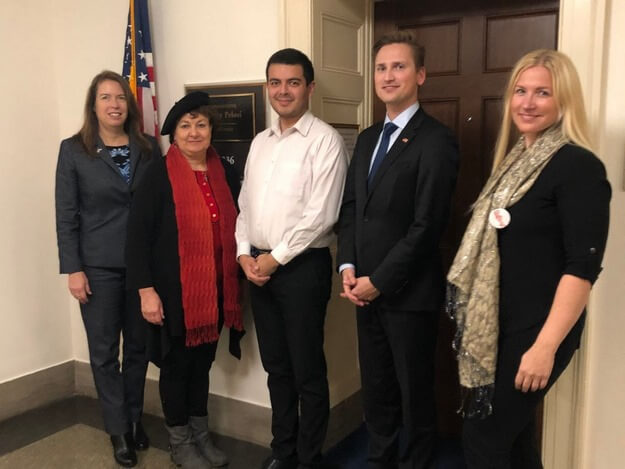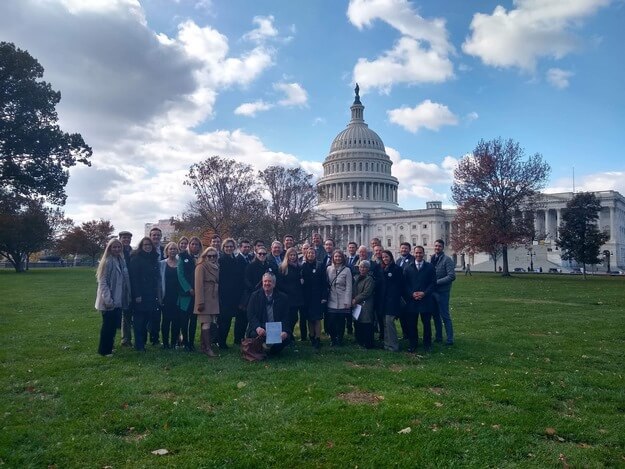
JBANC conference audience during opening panel. From left on stage: LAC president Saulius Kuprys, Lithuanian ambassador Rolandas Kriščiūnas, Estonian ambassador Jonatan Vseviov, and Latvian ambassador Māris Selga.
The Joint Baltic American National Committee held its 13th Baltic conference on November 9th in Washington, DC with the support of its parent organizations – the Estonian American National Council, the American Latvian Association and the Lithuanian American Council. The conference was held in conjunction with the 2019 EANC-JBANC Awards Gala hosted by EANC and included a successful advocacy day on November 8th.
Friday’s second annual Baltic Advocacy Day drew over 50 Baltic American constituents from 14 states. Meetings were held with staffers in the offices of their Senators and Representatives to discuss issues and legislation relevant to security in the Baltic region, including defense cooperation, energy security, the Three Seas Initiative, fighting corruption and kleptocracy, and joining the Baltic Caucuses in each chamber of Congress. Readers are encouraged to join us for Baltic Advocacy Day 2020, currently in the planning stages for the May-June timeframe. A new Baltic advocacy website called Baltivist.com will be a central source for information and registration for future Baltic advocacy events.
The full-day conference on Saturday featured keynote addresses by Estonian Prime Minister Jüri Ratas; Dr. Michael Carpenter, who is the former Deputy Assistant Secretary of Defense for Russia, Ukraine, Eurasia, the Balkans, and Conventional Arms Control; and Dr. Andres Kasekamp, Professor, Dept. of History, Chair of Estonian Studies and the Munk School of Global Affairs and Public Policy, University of Toronto. The ambassadors from the three nations gave welcome remarks and the conference was opened by current JBANC president, Saulius Kuprys. The full agenda and photos are available at jbanc.org and JBANC’s Facebook page.

From left: EANC Washington, DC Director Karin Shuey, EANC council member Tiina Sepp, foreign affairs staffer for California Congresswoman Nancy Pelosi, ALA representative Erik Lazdins, and EANC council member Marit Davey. Tiina and Marit represented San Francisco Bay area Estonians.
Prime Minister Ratas praised the work of JBANC as necessary to make sure the transatlantic alliance stays strong. He noted that the role JBANC and Baltic American advocacy played in “bringing formerly captive nations into the free world can’t be underestimated.” He also discussed cooperation among the Baltic countries in various strategic areas.
Dr. Carpenter called 1989 the most pivotal year in the evolution of democracy and identified the peaceful transition of the former Soviet and Warsaw Pact nations into liberal democracies as the thing that Putin laments most. He named the institutional battle between corrupt oligarchies and liberal democracy as the defining struggle of the 21st century. A sustained U.S. military presence in the Baltic nations, greater maritime presence in the region, and defense against subversive disinformation and financial practices are among the factors necessary to maintain a strong, unified NATO and healthy, successful democracies.
Panel discussions addressed four topics: 1. perspectives from JBANC’s three parent organizations featuring leaders from EANC, ALA and LAC, 2. NATO and threats in the Baltic neighborhood, 3. lessons learned from recent elections in the Baltic nations, and 4. issues around the media and disinformation. Panel speakers included Member of Estonian Parliament’s Foreign Affairs Committee Eerik-Niiles Kross; writer and long-time supporter of the Estonia, Latvia and Lithuania Paul Goble; National Security Correspondent at WTOP Washington JJ Green; Brian Whitmore from the Center for European Policy Analysis; and spokesperson for the Delegation of the EU to the U.S. Maria Belovas. Please see jbanc.org for the full list of speakers.
The panel discussions carried many common themes that impact the security of the Baltic region. Subversion of systems and democratic institutions by those taking money from Russia was Paul Goble’s biggest worry. Others agreed that new technology can spread disinformation like a megaphone to a public that is too overwhelmed by the sheer volume of information to process it all. The Kremlin is likely to continue interfering in elections and pushing the narratives of central and eastern European nations as failing states in moral decline and of Balts as hopeless Russophobes.

Baltic Advocacy Day participants in front of the Capitol.
One antidote is to take back control of the narrative and lead in the media and information space with evidence of the Western success story, even as the Kremlin is trying to rewrite it. The West needs to call out the Kremlin’s false stories and recapture and broadcast historical truth: that the Baltic nations were not liberated by the Soviet Union, they have thrived under democracy for decades, and they belong in Europe and nowhere else.
Karin Shuey
Washington, DC Director
Estonian American National Council
www.estosite.org












